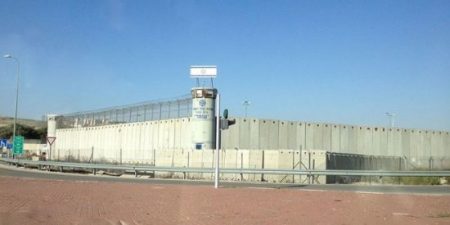Israeli prison guards raided and searched Section 5 of the Ramon prison and moved 100 Palestinian prisoners affiliated to the Fateh and Popular Front for the Liberation of Palestine (PFLP) movements to the Ohalei Kedar prison.
The Palestinian Committee of Prisoners’ Affairs said in a statement on Tuesday that the raids came in response to the prisoners supporting fellow prisoner Bilal Kayed, who has been on a hunger strike for 43 days, and hunger-striking brothers Muhammad and Mahmoud al-Balboul.
A spokesperson for the Israel Prison Service could not immediately respond to a request for comment on the raid.
On Monday, about 10 Palestinian prisoners were attacked by Israeli wardens in the Ofer prison, near Ramallah. This assault aimed at making prisoners suspend their hunger strike started in support with prisoner Bilal Kayed.
According to a lawyer from the Palestinian Prisoners Society (PPS), the Israeli jailers strip-searched hunger-strikers and cut the water on them.
The detainees started the hunger-strike in solidarity with Bilal Kayed, following another group of prisoners who suspended their hunger strike last Sunday. 27 more detainees in Israeli jails have gone on a hunger strike in support for Bilal Kayed, who has been starving for the 41st day in protest at being held administratively without charge or trial.
The two hunger-striking brothers and administrative detainees, Mahmoud and Muhammad al-Balbul, went through this aggression as well. The lawyer from the PPS also visited Ayad Hreimi and Malek Kadhi, two administrative prisoners who have been on hunger-strike 11 days ago.
Ma’an News Agency further reports that Kayed, a PFLP member, is one of the most high-profile hunger strikers since Palestinian journalist Muhammad al-Qeeq neared death, during a 94-day hunger strike before he was finally released in May.
After being sentenced to six months of administrative detention — imprisonment without trial or charges — the day he was set to be released upon serving 14 and a half years in prison, Kayed started his hunger strike, refusing food, supplements, and medical examinations, consuming only water.
The committee said that a crackdown on Palestinian prisoners has included a number of sanctions such as removing family visits, imposing fines, closing sections of the prisons and moving prisoners to closed sections, stripping them of their clothes, and handcuffing them.
In solidarity with Kayed and other hunger-striking prisoners, Palestinian prisoners have been going through a rolling system of hunger strikes, with some 50 prisoners going on a hunger strike for 10 days before another group of 50 prisoners begin their own 10-day strike, in an attempt to pressure the Israeli government to respond to the demands of hunger strikers.
According to the Palestinian Prisoner’s Society (PPS) on Tuesday, 45 Palestinian prisoners held in Israeli custody have joined the hunger strike protest in support of Kayed, as well as to denounce Israel’s ongoing use of administrative detention and a recent decision by the International Committee of the Red Cross to reduce the number of visits to one per month.
Although Israeli authorities claim the withholding of evidence during administrative detention is essential for state security concerns, rights groups have claimed that the policy allows Israeli authorities to hold Palestinians for an indefinite period of time without showing any evidence that could justify their detentions.
According to Palestinians, Israel also uses the policy to detain family members of Palestinian political leaders, in an extension of several policies that rights groups have deemed “collective punishment” aimed at disrupting family life for Palestinians in the occupied West Bank and East Jerusalem.
According to prisoners’ rights group Addameer, there 7,000 Palestinians were being held by Israel as of May, 715 of which were held in administrative detention.
Related: 07/26/16 Soldiers Attack Palestinian March, At Least 30 Injuries Reported

